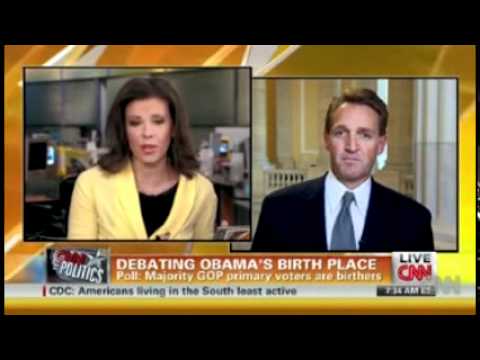Lawrence O'Donnell Slams Jeff Flake for Not Criticizing Birtherism Earlier, Even Though Flake Criticized Birtherism 8 Years Ago on MSNBC
Embattled Arizona senator getting dinged unfairly from the left for criticizing conservatives too late


Sen. Jeff Flake (R-Ariz.) has been all over the airwaves this month promoting his new book, Conscience of a Conservative, in which he laments that "Never has a party so quickly or easily abandoned its core principles as my party did in the course of the 2016 campaign." In the process Flake has predictably drawn heavy fire from Trumpworld, and perhaps less intuitively from certain quarters on the left.
For instance on Monday, in a segment shared with the inevitable social-media headline "Lawrence O'Donnell Shreds Jeff Flake for Being Six Years Late on Trump, GOP Criticisms," the MSNBC host played a clip of this recent exchange between the senator and Chuck Todd:
Flake: I wish that we as a party would have stood up, for example, when the birtherism thing was going on. A lot of people did stand up, but not enough.
Todd: Did you do enough? […]
Flake: On that? I think I did.
To which O'Donnell retorted, "Oh, no, no, no, no, you did not. You definitely did not do enough."
What was the evidence for O'Donnell's confidently dismissive assertion? This: "The first time we can find Jeff Flake saying something negative about Donald Trump's lies about Barack Obama's birth was in June of last year after Donald Trump had already locked up the Republican Presidential nomination."
But there's a problem with that particular search string. Birtherism—the subject of Chuck Todd's query—long predates Donald Trump's involvement in it. And Jeff Flake was out there condemning the conspiracy theory over Barack Obama's alleged lack of U.S. citizenship as far back as 2009, both legislatively and in the media. Including on MSNBC.
On July 27, 2009, the House of Representatives, of which Flake was then a member, voted 378-0 on a resolution "Recognizing and celebrating the 50th Anniversary of the entry of Hawaii into the Union as the 50th State." Conspicuously, for the politics of the time, the bill's third "whereas" in the preamble was: "Whereas the 44th President of the United States, Barack Obama, was born in Hawaii on August 4, 1961." As NBC News concluded back then, "It appears Congress has moved on and has accepted Obama's island birthplace." Or as a more gleeful Daily Kos headline put it, "It's Unanimous: Obama Born in Hawaii [and Freeper Meltdown]."
The resolution had nine Republican co-sponsors. One of them was Jeff Flake.
Chris Matthews brought Flake on MSNBC's Hardball the next night, touting him as a "leading co-sponsor" of the bill, and setting up their conversation with the question, "So what happened to the members of Congress who had been fanning the flames to delegitimize the president? Will they put to rest this insanity?" Here's are some selections from their exchange; bolding will be mine:
Matthews: The other [House Republicans] are [still] pushing this. They want to put a birth certificate out there. How do they reconcile that with voting to say that this president clearly is one of us?
Flake: I don't know. I suppose that other effort will go away pretty quietly now. I hope it does. I hope that this lays to rest any controversy that's out there. This shouldn't have been a controversy at all.
Matthews: What's in the water out there?
Flake: Well, I don't know. I think you saw some on the left, after the Bush-Gore race back in 2000, some who called Bush the illegitimate president for quite a while after that. And then you're seeing it here, not exclusively, but mostly on the right. It's unfortunate. It just kind of cheapens the debate.
At which point leading Democratic co-sponsor Rob Andrews, who was also on the program, cut in to call the Bush-Gore example "a ridiculous comparison":
Andrews: There is absolutely no doubt about Barack Obama's birth certificate. There's no dispute about this, which is why all you guys voted for it last night.
Flake: No, I completely agree with that….Some of us never questioned it.
Later, Andrews says "I mean, these guys ought to knock this off. Let's talk about jobs and health care and things that really matter to the people of the country."
Flake: Well, I agree, it's time to lay it to rest and go on. Some of us, like I said, never had that question at all. It's unfortunate that some did. But now I think it is laid to rest and we can address health care and the other issues. So I'm glad that we passed this resolution. I hope we can go ahead.
So Flake co-sponsored a resolution affirming President Obama's citizenship, with the specific intention of laying "to rest" a "controversy" that he said was "unfortunate" and "cheapens the debate." In 2009.
O'Donnell did not give any nods toward that history on Monday, instead slamming Flake for not issuing a condemnation on April 7, 2011, when Trump showily announced that he was sending investigators to Hawaii to search for Obama's birth certificate. "I said Donald Trump was lying about that that day, six years ago. Jeff Flake said nothing. But yesterday Jeff Flake said he thought he did enough in taking a stance against that lie. The first time Donald Trump opened his mouth about President Obama's birth, I said he was lying. Jeff Flake said nothing." (Trump had already been talking about the issue for a couple of weeks by then, for what it's worth.)

Missing from O'Donnell's self-aggrandizing criticism is that seven weeks prior to Trump's press conference, Flake had made scores of headlines—headlines like "Jeff Flake to birthers: Get real"—by stating point blank on CNN that, "The reality is that, yes, he was born in the United States. And so I hope that's not an issue going forward," and then, when asked the question, "Why do you think or do you think there's not enough, I guess pushback, from elected members and from our politicians to say that this simply isn't true? Do you think that for some people fanning the flames of this is actually politically helpful?" replying like this:
It's not. If you want pushback, I'll give it right now. Barack Obama is a citizen of the country. We ought to get off this kick. And there are plenty of differences we have with the president between Republicans and Democrats than to spend time on something like this.
One year later, running for Senate for the first time against a primary opponent who had expressed doubt about Obama's citizenship, Flake was asked at a Tea Party Forum his opinion on the matter. "I think he is our president," he responded. "I think he is duly elected and I believe he is a citizen. And I do believe it is a distraction. And my job is to make sure we beat him in November."
So widely known was Flake's aversion to the birth certificate business that the Washington Post could casually toss off sentences in mid-2013 such as "Conservative leaders like Sarah Palin, Karl Rove and Jeff Flake have long encouraged Republicans to move past the birther issue." Yet someone without that knowledge watching MSNBC Monday would have been left with the distinct impression that the first time Flake dared peep up was June 2016. (And not only was he speaking out then, he was openly lobbying his fellow Republican officeholders to withhold endorsement of their party's presumptive presidential nominee, on grounds that "some of the things he's done I think are beyond the pale.")
Having skipped over all of these examples, O'Donnell was better able to sell as cowardly opportunism Flake's willingness to condemn birtherism now, as opposed to September 26, 2016, when the subject came up in the first general-election presidential debate. "It would have been much more important for Jeff Flake to say something that night, on debate night, than it was yesterday now that Donald Trump is the most unpopular first-year president in the history of polling," he said. "It takes far less political courage to say that now." (Three weeks prior to that debate, Flake had said, "I think Republicans do need to distance themselves from Donald Trump," after which Trump tweeted, "The Republican Party needs strong and committed leaders, not weak people such as @JeffFlake, if it is going to stop illegal immigration.") O'Donnell's conclusion? "We are never going to count Jeff Flake as part of America's early warning system that will try to save us from the worst poisons in our political system."
I think O'Donnell's overall characterization of Flake's position and comportment is unfair. It is also not unusual. The New Republic's Brian Beutler scoffed in a headline at Flake's "Ridiculous, Fake Anti-Trump Rebellion" (among Beutler's bill of particulars: The senator failed to object to the Republican National Committee hiring Kayleigh McEnany as a spokesperson). "Evidence of Sen. Jeff Flake's newfound conscience continues to be hard to come by," snarked a diarist at Daily Kos. Syndicated Miami Herald columnist Leonard Pitts summarized the sentiment:
This courage would be more impressive had it shown itself sooner. The GOP, after all, didn't lose its mind when Trump came to town….
[This is] about the GOP's en masse retreat from reason, responsibility, statesmanship and simple decency.
This retreat has been objectively obvious for years, but the list of Republicans willing to stand up and concede the objectively obvious has been pathetically small.
Now Flake adds his name, making it…slightly less small.
I don't expect Leonard Pitts or Lawrence O'Donnell (or anyone, for that matter) to share my unusual policy preferences, but I do hope they read this January 2016 Reason interview with Flake, in which he slams his own party's ascendant trends on immigration, trade, and fiscal stewardship, and also this 2006 exchange, in which he gave a classic answer to what a GOP-led Congress might do to appeal to libertarians: "At this late date? Adjournment."


Show Comments (107)